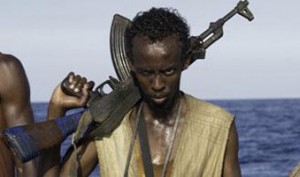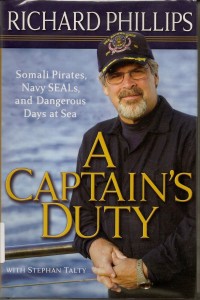The Real Story: Captain Phillips and the Somali Pirates
Posted on October 10, 2013 at 8:00 am
This week’s release of “Captain Phillips” is based on the real-life story of the 2009 capture of an American merchant ship by Somali pirates. The title character, played by Tom Hanks, was kidnapped by the pirates and held for ransom. Captain Richard Phillips was rescued by the Navy Seals after sharpshooters killed three of the four pirates.
 The leader of the pirates is played by Barkhad Abdi, a Somali immigrant who moved to Minnesota with his family when he was seven, in his first role as an actor. In an interview, he explained that he was selected for the role following a casting call that included more than 700 other men who wanted to be in the film. He trusted director Paul Greengrass to present the Somali characters without demonizing them.
The leader of the pirates is played by Barkhad Abdi, a Somali immigrant who moved to Minnesota with his family when he was seven, in his first role as an actor. In an interview, he explained that he was selected for the role following a casting call that included more than 700 other men who wanted to be in the film. He trusted director Paul Greengrass to present the Somali characters without demonizing them.
One of his quotes, he said was just a simple man that was in a situation that was bigger than him. Because this piracy thing is basically international organized crime. The people that actually benefit out of it are not even in Somalia; they’re somewhere in Europe or America or some other country. And it’s a big corporation. And the people that actually take the risk don’t even take much.
He talked about how he put himself in the frame of mind of his character, a desperate young man.
That was important to me. Because as a person, I was born in Somalia, you know? I left Somalia when I was seven years old, but I witnessed a whole year in a war. I witnessed the war’s beginning, which was really extraordinarily crazy. Just the same neighborhood that you were born and you grow and the same good people. That’s all you’ve seen in the world — and just torn to a disaster overnight: killing and rape and all this unbelievable stuff going on.
I was lucky enough to have parents that took me out from country to country and go to school and learn how to be a better person. But, I used a lot of imagination. Like, what if that was me? What if I didn’t have the same parents I have? What if my parents would have passed away? I mean, this would have been about me. I know exactly the situation he’s in, because Somalia didn’t have a country for the last 24 years. There’s no jobs; there’s no hope. And besides the fact that all these guys become millionaires right in front of you — people that you know. That’s enough motivation to take your chance fully. You’re either going to live good or you’re going to die trying.
Greengrass kept his lead actors apart until they were filming their scenes.
It was really a great idea, because it’s not an easy task coming on as just a crazy guy that’s taking over and being so mean to someone that you know and you admire, you know? So it was good that I hadn’t met him.
 The movie is very true to the real story, as Richard Phillips described it in his book, A Captain’s Duty: Somali Pirates, Navy SEALS, and Dangerous Days at Sea
The movie is very true to the real story, as Richard Phillips described it in his book, A Captain’s Duty: Somali Pirates, Navy SEALS, and Dangerous Days at Sea. It describes the takeover of the ship by four young pirates and their insistence on a ransom of millions of dollars. Captain Phillips protected his crew and was taken hostage for four days of abuse and threats. President Obama said after it was over, “I share the country’s admiration for the bravery of Captain Phillips and his selfless concern for his crew. His courage is a model for all Americans.” Some members of the crew have filed lawsuits against the shipping company, alleging that their negligence put the crew at risk by going too close to the Somali coast, despite warnings to stay at least 600 miles away. But there is no question that Captain Phillips’ courage and determination kept his crew safe at the risk of his own life and the extraordinary skill of the Navy Seals is what kept him alive.
Slate provides further information about Somali pirates. The incident in this film was one of over 200 in 2009.
In the film, Muse briefly mentions foreign vessels coming to take away the fish off the Somali coast. Viewers new to the subject may not know what to make of these remarks, but they refer to what many observers believe was a precipitating cause of the uptick in Somali piracy roughly 20 years ago. When the regime of longtime Somali dictator Siad Barre collapsed in 1991, the country was plunged into ongoing violence between rival armed groups and left without a central government capable of defending the country’s economic interests—including the “exclusive economic zone” off the Somali coast. Fleets from Europe and Asia quickly moved in, depleting the supply of fish.
As an African Development Bank report from 2011 put it, “Fishermen, dismayed at the inability of the central government to protect their country’s EEZ, and at the number of foreign fishing vessels illegally exploiting their traditional fisheries, took matters into their own hands. Initially arming themselves to chase off the illegal foreign fishing vessels, they quickly realized that robbing the vessels was a lucrative way to make up for lost income. Seeing their success, land based warlords co-opted some of the new pirates, organizing them into increasingly sophisticated gangs.”
The efforts of a combined task force to combat piracy and changing circumstances in Somalia have led to a sharp reduction in the number of ships hijacked and held for ransom. However, for other reasons, Navy Seals were back fighting in Somalia this week.
